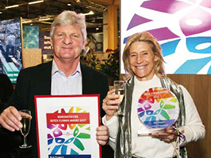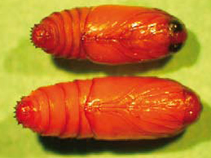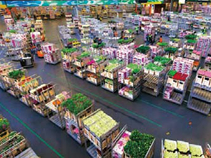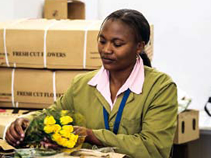 “ADAMA is a part of the second green revolution in Kenya,” says Mr Ido Rahat Product Strategy Manager. The world leader in crop protection solutions, founded over 70 years ago with roots in Israel has partnered with Amiran Kenya Ltd in Kenya and has successfully improved the lives of many farmers with its innovative, farmer-centric products.
“ADAMA is a part of the second green revolution in Kenya,” says Mr Ido Rahat Product Strategy Manager. The world leader in crop protection solutions, founded over 70 years ago with roots in Israel has partnered with Amiran Kenya Ltd in Kenya and has successfully improved the lives of many farmers with its innovative, farmer-centric products.
What sets ADAMA apart?
Mr Ido Rahat Product Strategy Manager says “ADAMA is the unique and successful partnership of Kenya and Israel. We bring the superior agriculture technology of Israel and adapt it to the Kenyan market using local expertise. Our goal is to help farmers with modern technologies that enable them to reap the most benefits from their fields and crops. All our products are created by first identifying the farmer need, finding a solution for it using the R&D expertise, and finally delivering a product that is tailor-made for the local market.”
Launch of Bigo
Mr Ido Rahat said this while addressing flower growers in Naivasha during the launch of Bigo, one product with two modes of action on both downy mildew and botrytis. Mr. Ido said Bigo is a combination of two different molecules Fluazinam and Dimethomorph which have translaminar and contact activity against Downy Mildew and Botrytis. Combining these two molecules with two different modes of action enables Bigo to target two diseases at once. Thus, the uniqueness of Bigo is that addition to its high efficacy on Downy mildew, it is a good choice to control Botrytis as it kills any botrytis spores o the rose stems or heads simultaneously




 Nini Flowers from Kenya was rewarded with the Dutch Flower Group Award last week. Owner Billy Coulson is very proud and feels honoured. ”We didn’t think we would win. We’ve got a strong relationship with DFG, but we didn’t realise we were already in that league. I’m very proud of our team.”
Nini Flowers from Kenya was rewarded with the Dutch Flower Group Award last week. Owner Billy Coulson is very proud and feels honoured. ”We didn’t think we would win. We’ve got a strong relationship with DFG, but we didn’t realise we were already in that league. I’m very proud of our team.” The False Codling Moth (Thaumatotibia leucotreta or FCM) is a threat to many of our flowers fruits, vegetables and other crops. Increased international trade and tourism has increased the risk of introduction of this pest. False Codling Moth can survive in climates described as tropical, dry or temperate. It is estimated that approximately 50 percent of the global environment may be suitable habitat for FCM.
The False Codling Moth (Thaumatotibia leucotreta or FCM) is a threat to many of our flowers fruits, vegetables and other crops. Increased international trade and tourism has increased the risk of introduction of this pest. False Codling Moth can survive in climates described as tropical, dry or temperate. It is estimated that approximately 50 percent of the global environment may be suitable habitat for FCM. Consumer behaviour is always changing. Sometimes buyers want a good quality plant or bunch of flowers for a low price. At other times they want something very special and purchase price is not an issue. Millennials are driving further growth in online sales. Babyboomers are set to retire and are expected to increase their expenditure on flowers and plants. In the next decade, Rabobank is expecting a 2% growth per year in cut flower and potted plant expenditures in Europe and North America, with Asia growing 6-8% annually. Rabobank expects the growing demand in Asia to be mainly fulfilled by products grown in Asia.
Consumer behaviour is always changing. Sometimes buyers want a good quality plant or bunch of flowers for a low price. At other times they want something very special and purchase price is not an issue. Millennials are driving further growth in online sales. Babyboomers are set to retire and are expected to increase their expenditure on flowers and plants. In the next decade, Rabobank is expecting a 2% growth per year in cut flower and potted plant expenditures in Europe and North America, with Asia growing 6-8% annually. Rabobank expects the growing demand in Asia to be mainly fulfilled by products grown in Asia. The share of the rejected stems in the Kenyan supply chain from farm to the market with the current packaging is roughly 20% on average. A more standardized box will help us save on this. However growers could not well agree on what should be the first step in piloting a new box. While most agreed that the cost of the box would be the main consideration, others felt processes and handling procedures in the supply chain should dictate the standard box. Floriculture Magazine spoke to some of the industry stakeholders. Below are the excerpts:
The share of the rejected stems in the Kenyan supply chain from farm to the market with the current packaging is roughly 20% on average. A more standardized box will help us save on this. However growers could not well agree on what should be the first step in piloting a new box. While most agreed that the cost of the box would be the main consideration, others felt processes and handling procedures in the supply chain should dictate the standard box. Floriculture Magazine spoke to some of the industry stakeholders. Below are the excerpts: